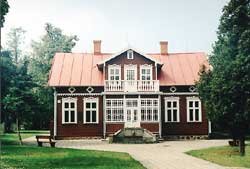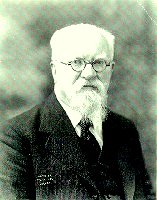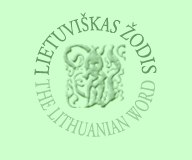 Address Address
23 a. Vytauto Str., LT-5720 Palanga.
Tel. +370-460-54559.
-
- Opening times
1 May to 1 October:
Monday to Sunday 12.00-19.00.
1 October to 1 May:
Wednesday to Sunday 11.00-17.00.
-
- Admission charge
Adults, pupils and students - Lt 2.
-
- Exposition
Opened in 1995, the exposition illustrates the life and work of
Dr. Jonas Sliupas (1861-1944), a prominent figure of Lithuania’s
struggle for nationhood.
-
 Dr.
Jonas Sliupas Dr.
Jonas Sliupas
J. Sliupas (1861-1944), physician, publicist, and nationalist
liberal activist.
He studied history, philology, and law at the University of Moscow
(1880-1881) and
natural sciences in St. Petersburg (1882).
J. Sliupas accepted an offer to edit Ausra (The Dawn), the monthly of
the Lithuanian national movement published at Lithuania Minor (East
Prussia).
After secretly visiting Lithuania, he left for the United States in
1884. There he acquired a doctor of medicine degree from the
University of Maryland Medical School (1891) and began practicing
among Lithuanian immigrants.
Sliupas was one of the most noted and energetic Lithuanian-American
activists of his time. During the 35 years he spent in the United
States, he founded and edited one publication after another.
In publications he promoted a materialist and atheist liberalism,
frequently attacking the clergy and faithful, in the harshest of
terms, as exponents of a regressive and unenlightened menthality.
Dr. J. Sliupas founded, alone or in collaboration with others many
organizations: Friends of Lithuania, Alliance of All the Lithuanians
in America, Lithuanian Learned Society, Lithuanian Freethinkers’
Alliance and Lithuanian Socialist Alliance.
During World War I Sliupas was prominent in the action to reestablish
independent Lithuania. He chaired the Lithuanian Autonomy Fund, which
provided financial help for the reconsruction of Lithuania, and was a
member of the American Lithuanian Council.
In 1917 he took part in Lithuanian conferences in Russia and Sweden.
In 1919 he helped organize the Lithuanian mission in London and served
on the Lithuanian delegation at the Paris Peace Conference. Returning
to Lithuania in the summer of 1919, he was appointed his country’s
first minister to the states of Latvia and Estonia.
From 1925-30 he taught history of medicine at the University of
Kaunas.
He was awarded honorary doctoral degrees by the university’s
medical, humanities, and law faculties.
In 1933 he was elected mayor of Palanga.
He withdrew from Lithuania in anticipation of the second Soviet
invasion (1944); he died in Berlin in 1944.
-
|

